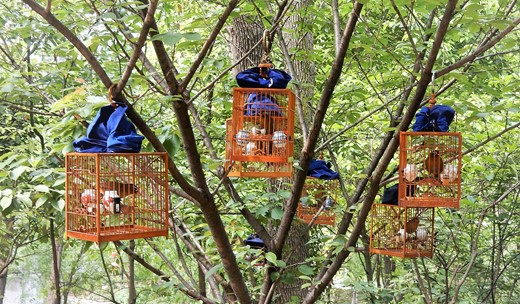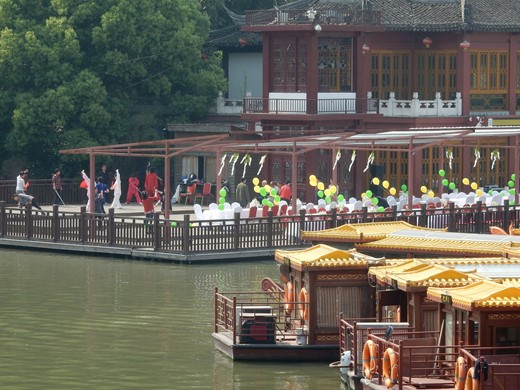China Easter 2. Nanjing
From Hainan Island, I travelled up to Beijing. The flight up was a nightmare with a four-hour delay, and a serious lack of information at any time as to causes of the delay and when the flight would actually depart. At the airport, there were continual announcements that this flight and that would not meet its departure time, but without reasoning or new times. My wife has a house quite close to the airport, and by the time we arrived there, the first light of morning was already coming through. Having discovered that my wife did not need my help on a business meeting, I suggested I could travel to a Friday game in the China Super League before heading back on the Saturday for a Beijing derby in League One.
For this one, the train tickets were booked by internet, 24 hours in advance. This allowed me to get a First-class ticket – all second-class tickets having sold out, at least I got the standard price (around £30 less) for the return. At the station, I still had to queue 20 minutes for the ticket, but the process was relatively simple then – I showed my reservation number and passport and they printed a ticket. When I asked for the return as well, I was charged 5 Yuan (50p) for this service, but again completed without problem. The train had an appearance to Japanese bullet trains, and soon reached 300 km/h. Inside, it looked and felt little different from any European fast train, and the similarities continued when we soon had a thirty-minute delay, with a serious shortage of announcements (in any language) as to why, or for how long. I later discovered that the problem had been a complete power failure for lines around the city of Tianjin, so it turned out that I was quite lucky to get to my destination at all. I am also told, (by ex-pats in China), that these occurrences are actually quite rare, and the fast rail network in China is normally more reliable than the British rail system
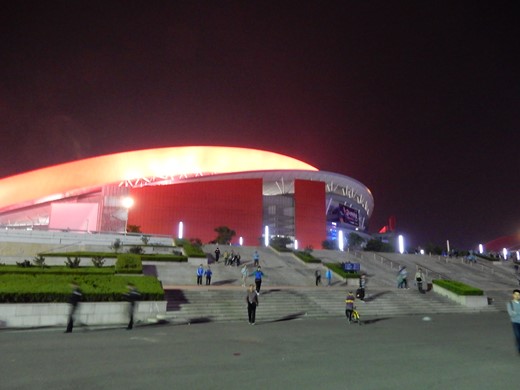
On other sections, we appeared to go quite slowly, and ended up with arriving at Nanjing 70 minutes behind schedule, which was a problem for my plans. I was intending to go to check into my hotel first, and then to arrive at the ground anything up to an hour before kick-off. Instead, I had to get a taxi to the ground directly just to make it within 30 minutes of the start. Fortunately, the good offices of my wife had made contact, to find an English-speaking official who met me and saw me into the ground. I did not pass any of the ticket sales points between leaving the taxi and entering the ground, so without this help, I may have struggled to enter before the start.
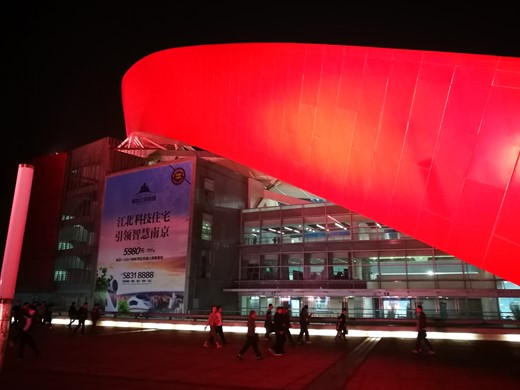
The stadium looks spectacular from the outside, thanks to two red arches, which lean back at 45o painted in bright red, which just accentuates the effect. It is the centre of a sports park, including an arena, swimming pool and tennis centre with the latest head tennis racquets. It staged the Chinese National games in 2005 and the youth Olympics of 2014. Inside, we have a fairly standard stadium with a track, and two tiers of seats all the way around. On both sides, there is a third tier, which increases in height towards the centre. However, the forward section of the lowest tier has only a low rake, with the front row barely above pitch height. Add in the track and the benches, and the views are quite restricted, especially on the west side of the ground. My recommendation to anyone else visiting the ground is to take seats on the East side, where at least there is nothing to block your viewing (and it is 50 Yuan less). From my position, it appeared that the rake on that side was greater, but this was probably an optical illusion, possible due to the much higher numbers of people standing over that side. The main section for the singing fans was in to the north of the East stand, although there was also a section behind the North goal. I noted that these used different styles of flags, perhaps a more independent group of fans, as the main section had flags that reflected (and were probably supplied by) the corporation running the club. Chants referred to both parts of the name, Jiangsu (which is the province) and Suning (the owners). On my side of the ground, there were six traditional large Chinese drums, which blocked the gangways and were used only sparingly. High up in the upper tier of the South East was a group of Guangzhou fans, outnumbered by the police and army who sat in the blocks between them and home fans.
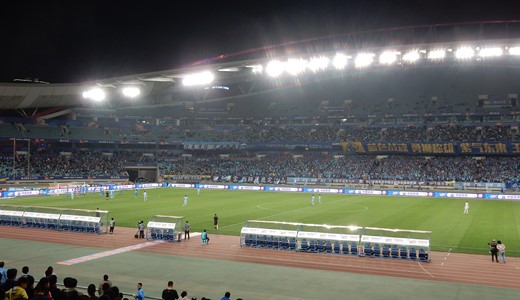
Both sides fielded three foreigners from the start, although as it happened, both took one off at the break. The Chinese FA changed the rule for number of foreign players just ten days before the end of the pre-season transfer window, catching some clubs out. Some were in the process of negotiating further signings and suddenly found they were on the limit. Jiangsu have four foreign players on their books, but can only play three, with the Columbian international Roger Martinez as the man left out. They played Hong Jeong-Ho at the centre of defence, Hong is a Korean international who was playing for FC Augsburg in the Bundesliga when I watched them two years ago. In the midfield, they had ex-Chelsea player Ramires, who set a Chinese transfer record when he signed in January 2016. This record was broken twice in the following ten days, the second time to bring another Brazilian, Alex Teixeira to Jiangsu from Shakhtar Donetsk. Before Jiangsu signed Teixeira, he was reported to be a Liverpool target, but they shied away from the asking price.
For Guangzhou R&F, there are five foreign players in the squad, (if you have five, one must be from an Asian (meaning AFC, so including Australia) nation). You still can only play three, so the Korean Jang Hyun-Soo and the Brazilian Renatinho were not played. A second “Asian”, Apostolos Giannou was one of the forwards, Giannou was born in Greece, but qualified for Australia as his family emigrated there. It appears he has taken time to decide where his affiliations lay, as he played for Australia at under-17 level, and Greece at under-19 and under-21. Greece named him in squads a few times at full international level, and finally played him as a substitute in a Friendly in November 2015. Despite this, he could still transfer, and the following March he played for Australia in a World Cup qualification match. To date he has five caps for the Socceroos. In midfield, Guangzhou played Junior Urso, a Brazilian who had played in his native country until 2014 when he joined Shandong in China. He moved to Guangzhou this season. Finally, and most impressively, they have the Israeli, Eran Zahavi. Zahavi has played most of his football in Israel, appearing for both Maccabi and Hapoel in Tel Aviv. A short spell with Palermo in Italy was not a success. He moved to China last summer and impressed immediately, so much so that Shandong wanted to take him on, which would have been the biggest transfer fee ever paid for an Israeli.
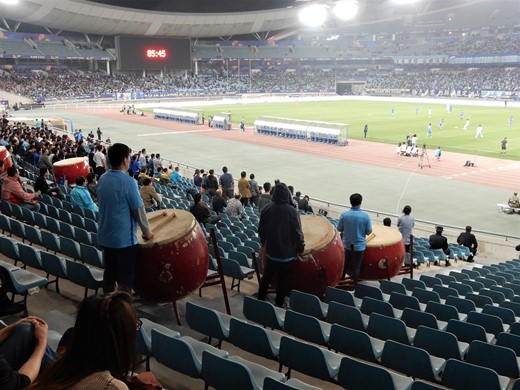
Both teams played in a 3-5-2 formation, although they differed slightly in that Jianye Lui at centre midfield for Jiangsu was playing a holding role, while Junior Urso, in the same position was much further forward. Suning played in an all sky-blue kit, apart from a narrow dark blue strip on each side. R&F played in dark blue. Guangzhou were well on top in the opening exchanges, with the best chance falling to Zahavi who blasted the ball over the bar. Guangzhou seemed to playing the game of get the ball to the foreigners, while Jiangsu were using their home players better. The target for much of their play out of defence was left wing back Haiqing Cao. The tactic brought Jiangsu more into the game, and it appeared that Ramires, in midfield could be the key player. Mid-way through the half, they changed the attacking partner of Teixeira from Tianyi Gao to Xiang Ji. This appeared to be a popular move, and was listed in reports as a tactical substitution. If so, then I am not convinced by the tactic. One of the regulations introduced for this season is that every team must start the game with a (Chinese) Under-23 player. There is no rule that states how long he is on the field for – Tianyi Gao is an U-23 player, and he has started every game for Jiangsu this season, and been substituted in every game. At least he has averaged almost 45 minutes per game. Some of the young players have been removed from the field within ten minutes of the start. Other teams are more serious about giving (at least one) youngster a chance, for Guangzhou R&F, their young player was Huang Zhengyu who has played in all seven games this season, and not been substituted once.
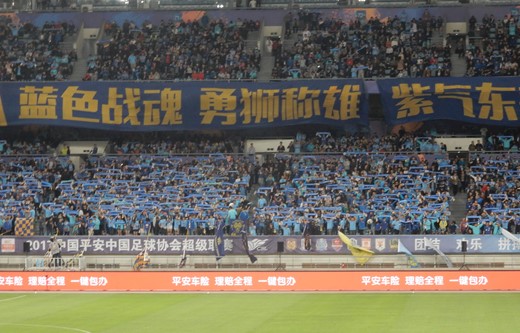
Pre-match ritual.
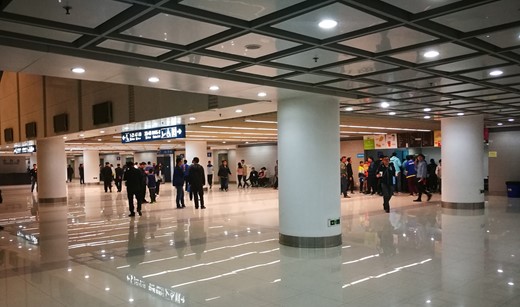
The concourse at half time, looking as spick and span as any shopping mall.
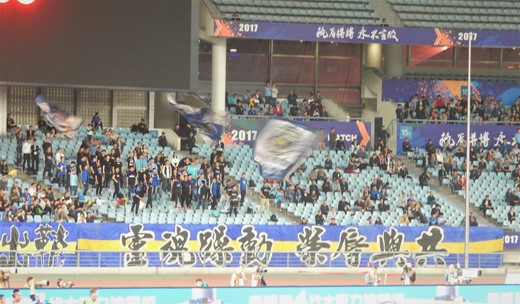
Fans behind the goal used different flags to those at the side of the ground.
Good substitution or not, it was Jiangsu who scored first, with Haiqing Goa’s long ball finding Teixeira in space, running past the last defender and hitting the shot past the keeper. Inspired by this, Jiangsu were the better team for the rest of the period. We had a stoppage within injury time, when Hong Jeong-Ho was injured. He was replaced during the break and this would prove a crucial change. Also at the break, R&F made two changes, with the ineffective Junior Urso and left sided Tiaxiang Li being replaced by Zhizhao Chen and Zhi Xiao. For the visiting side, these changes had the required effect, with the midfield looking somewhat more mobile, while the home defence looked shaky without the Korean leader. Both teams were now playing the game of get the ball to the foreigner, but it is not the quality of the foreigners that was decisive, but the quality of the home-grown players. The home team were missing two many passes, or shooting when a pass was better with Haiqing Cao and Xiang Li both being regular culprits. By contrast, the visiting midfield were in control of the game, creating many chances for Giannou (who would surely have scored if he was less concerned with showboating and doing something spectacular), and the hard working Zahavi. It was Zahavi’s ability to find space and test the keeper with good shots from distance that proved crucial. He scored both goals from just outside the box, as his side turned over the half time score. Jiangsu were runners-up in both league and FA Cup last season (Guangzhou Evergrande won both, the Cup on away goals over two legs). However, this season they are in the bottom two without a win in six league games, while at the same time have won all four of the Asian Champions League encounters, (ring any bells, anyone). A local supporter put this down to the China Super League being a superior competition to the Champions League, but this is not so clearly evident in the other groups, (although all three in contention should go through)
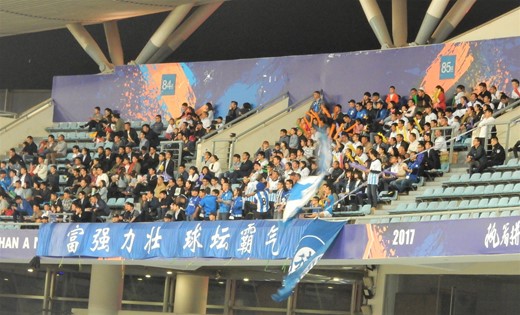
Away fan section. With the riot squad seating comfortably between the away fans and any home areas
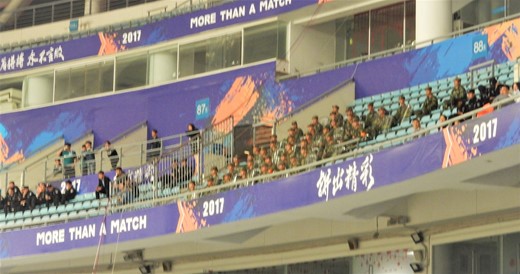
After the game, I found my hotel after some difficulty with the taxis, and later went out to what is known as the 1912 district. While having a degree of night life, and popular with locals, it does is not what is says on the can, evocative of the China of 1912. Instead it is a modern cluster of cafes and late night discos. There are plenty of options to eat, the best of which are almost certainly just outside the “zone”, where prices are lower and anything that has ever swan appears to be available. I just wanted a beer, and there are few options here, although I eventually stumbled on a bar which not only had a massive selection of imported beers, but could also offer a local craft beer.
In the morning, I tried out the local metro and went on a quick trip into the town. With only three hours at my disposal, I had intended to find the Confucian temple, but instead ended up in the pleasant surrounds of Egret Island. This is one of the confusions that can occur when touring without a map. I knew I was close to the temple, but despite signs and maps indicating its location, and it being quite a large complex, I never actually walked towards it. The area I was in is popular with locals, and is a more genuine slice of China, a place where people can take their caged birds out for a walk, or practise their morning Tai Chi exercises.
